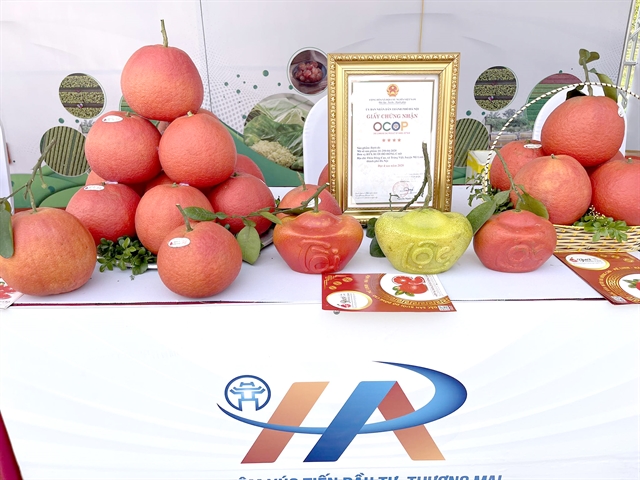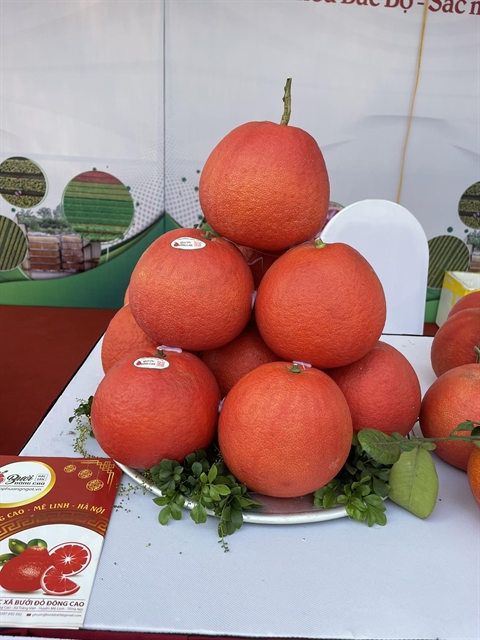Hanoi enhances intellectual property progamme to increase product value
Hà Nội has employed numerous specific methods to create a clear change in awareness of enhancing the application of intellectual property (IP) to protect the interests of owners
 |
|
Đông Cao red grapefruit (Tràng Việt commune, Mê Linh), is one of the agricultural products under the IP development programme of the Hà Nội People's Committee. —VNS Photo |
HÀ NỘI — Hà Nội has employed numerous specific methods to create awareness about enhancing the application of intellectual property (IP) to protect the interests of owners.
Intellectual property (IP) activities have been booming in Hà Nội lately, and these developments have significantly contributed to the progress of innovation, science, and technology as well as the socioeconomic growth of the city. This is an important premise for realising the Intellectual Property Development Program until 2030.
Speaking at the opening exhibition of intellectual property development results in Hà Nội on December 12, Nguyễn Anh Tuấn, Deputy Director of the Hà Nội Department of Science and Technology, said that Hà Nội was one of the leading cities in establishing IP rights. By the end of the second quarter of this year, the number of industrial property registration applications was 4,335, accounting for 34.3 per cent of the country. Of these, there were 96 patent applications, 48 utility solution applications, 155 industrial design applications, and 4,036 trademark applications.
The city's programme has brought about a positive impact by raising awareness and interest among businesses in protecting their intellectual property for agricultural products. This has led to improved management and commercial exploitation of products. The programme also supports stable manufacturers and helps people increase competitiveness and income.
For instance, Đông Cao red grapefruit (Tràng Việt commune, Mê Linh), is one of the agricultural products under the IP development programme of the Hà Nội People's Committee, with a traceability stamp and collective brand logo. The management and brand development capacity of Đông Cao Agricultural Cooperative has improved, while the government and consumers are raising awareness of building brand value for local vegetables, thus affirming their position in the market.
 |
|
Đông Cao red grapefruit with a traceability stamp. — VNS Photo |
Lương Văn Phương, Director of Đông Cao Red Grapefruit Cooperative, said that since participating in this programme, Đồng Cao red grapefruits have been available in many convenience stores and supermarket chains across the country.
“Collective trademark registration has helped establish the product as a reputable brand, contributing to increased value, providing opportunities for organisations and individuals, and building trust with customers,” he affirmed.
Solutions to improve management efficiency
Hà Nội has actively deployed and implemented the intellectual property development programme in the area. The Department of Science and Technology in Hà Nội works closely with the People's Committees of towns and districts to evaluate and choose products that meet the city's requirements for ownership protection, such as collective marks, certification marks, and geographical indications.
Hà Nội's intellectual property development programme aims to train 50 per cent of local businesses and support 40 per cent of key products and services associated with the One Commune One Product programme (OCOP) to register for IP protection by 2025. The programme also aims to control the origin and quality of these products after they have been protected
Tuấn Anh suggested coordinating new and creative innovations to increase agricultural product quality and quantity. He also aimed to conduct research results that are protected by IP rights and support businesses to promote the use of IP tools in production and business activities.
Besides that, strengthen the management of resources and urban culture to exploit the potential of strong products, while prioritising the registration of intellectual property rights for goods with high export potential.
However, building a product brand is challenging, and maintaining and developing it is even more difficult. It requires businesses to establish and properly implement regulations for managing brand usage, raise awareness and responsibility among producers, and create solidarity in production and business. It's also important to strengthen the introduction and promotion of IP products through mass media, thus gaining wider recognition.








